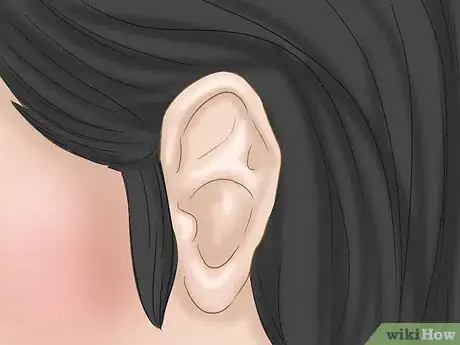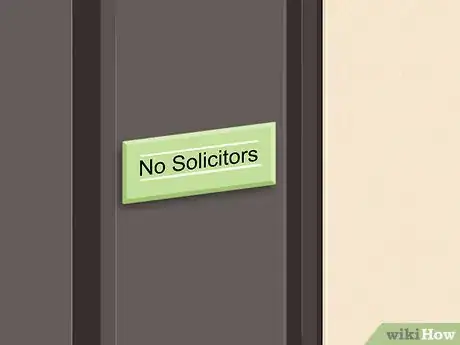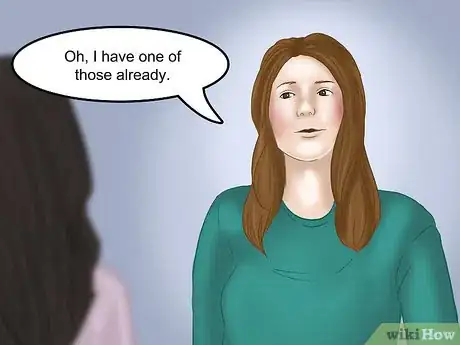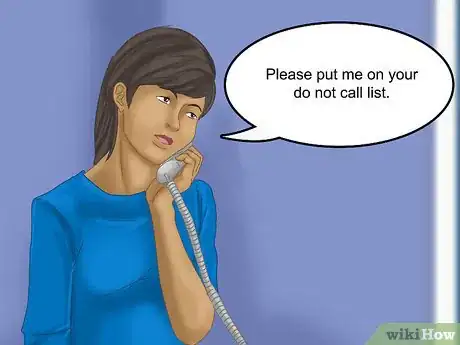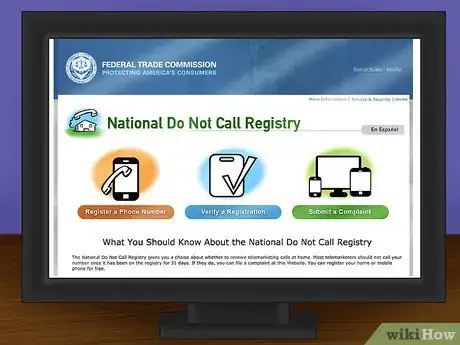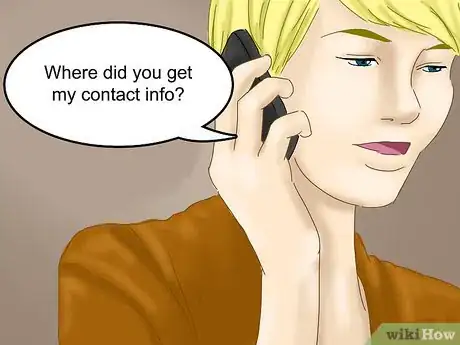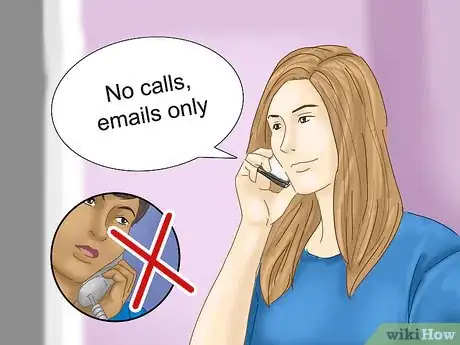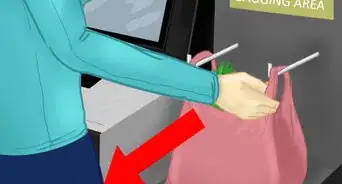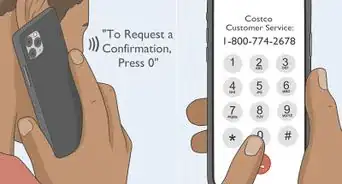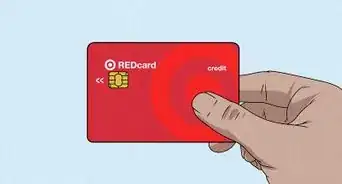This article was co-authored by wikiHow Staff. Our trained team of editors and researchers validate articles for accuracy and comprehensiveness. wikiHow's Content Management Team carefully monitors the work from our editorial staff to ensure that each article is backed by trusted research and meets our high quality standards.
This article has been viewed 26,270 times.
Learn more...
Have you recently walked through the mall or a store and some salesperson approaches you trying to offer a demonstration or pester you about some product? Even worse, perhaps you’ve had a visit from a door-to-door salesperson, or received a phone call from a telemarketer. Firmly say no to annoying salespeople while still being polite, but never be afraid of hurting their feelings by refusing their pitch. If they sense you're nervous or feel bad, they'll do their best to reel you in.
Steps
Handling Salespeople at Stores
-
1Tell them you’re just looking around. Let them know they’re not getting a sale today because you won’t be spending any money. They’ll lose interest in you and avoid you if you let them know you’re just browsing. Politely let them know they’d be better off talking to a customer more interested in actually buying something.[1]
- Try saying, "Thanks, but I'm just browsing today," or "I don't have any money on me - just looking!"
-
2Try not to look uncertain. Don’t tell the salesperson that you’re not sure what you want to buy or show them that you’re indecisive about anything. They will interpret your uncertainty as an open invitation to sell you something or describe a product. Tell them you know what you’re looking for and would prefer to shop alone.[2]
- Consider saying, "I know what I'm looking for and where it is, thanks!" Try out, "I don't need help, thank you," or "I know where to find what I need."
Advertisement -
3Use body language to convey your disinterest. When you’re in a store, avoid making eye contact or smiling at salespeople who appear to be persistent or aggressive. Don’t engage them in small-talk or give them an opportunity to pivot from a nice conversation to sales pitch. You don’t need to yell or look really mean, but you can effectively convey that you’re not an approachable target.[3]
- Try pretending you're talking on the phone, texting, or otherwise too occupied to engage in a conversation.
-
4Keep walking as you pass a shop or kiosk. If you’re walking through a mall or market with small shops or kiosks, don't slow down when salespeople try to get your attention. Keep up your pace, so they won’t be able to recite a pitch to you. Give a polite smile or head nod as you pass by, but make sure you keep walking so you don’t seem approachable to them.
- Consider saying, "Thanks, but I'm in a rush!" as you pass.
-
5Listen politely for a few minutes. Alternatively, if you might be interested in what the salesperson is selling, give them a minute to make their pitch. Whether in the store, a kiosk, or elsewhere, listen to their description and deal if you’re in the market for their product or service.
- Just make sure you’ll be able to be firm and say no if it turns out you’re really not all that interested. Don’t get pulled into a deal you didn’t really want or need.
- As soon as you decide you're not into the pitch, interrupt them and try saying, "Thanks but no thanks!" or "Okay, I've really got to get on my way, thanks for the info!"
Saying No to Door-to-Door Salespeople
-
1Just say "no" or “no thanks.” If someone knocks on your door to sell you something and you don’t want to hear it, just refuse to participate. Be firm about it. Say, “Thanks, but no thanks. Have a great day.” Remember there is nothing wrong with saying no, and you should work on being able to say it if you have trouble.[4]
- Whether in a store, at your door, or over the phone, salespeople can and will take advantage if you feel bad for them. Don’t worry about hurting their feelings by saying no.
-
2Post no knocking or no solicitors signage. Get stickers or signs that will let door-to-door salespeople you don’t answer uninvited knocks or solicitors. Check with your local government or neighborhood association to see if they have any official or uniform signs that you should post. In many areas, soliciting despite there being a clearly posted sign is a local code violation.
-
3Excuse yourself or make something up. If you’re nervous about saying no to someone, just relax and politely excuse yourself. Try saying, "I'm very happy with the brand I use now," "Oh, I have one of those already,” or "No I just don't need one of those right now."
- Kids make a great excuse for just about anything - tell the salesperson you really have to get back to looking after the kids.
- Say you’re cooking a meal, in the middle of a chore, on the phone, or something else that requires your immediate attention if you don’t want to just say no.
-
4Don't open the door if you're suspicious. If you don't want to be bothered, have posted no-knock signs, or are suspicious of door-to-door scams, don't open the door at all. In addition, if you're a senior, a teenager at home alone or babysitting youngsters, or in any similarly vulnerable position, avoid opening the door unless you are expecting someone you know and trust. Consider calling the police if you are aware of door-to-door scams happening in the area or if the person knocking won't leave.
Dealing with Telemarketers
-
1Don’t just hang up right away. If you hang up on a telemarketer right away, you’ll probably be placed on the “no answer” list, and will be called again eventually. You don’t want to engage a telemarketer in conversation either, especially if you have absolutely no interest in their product or service.
- The easiest way to handle a telemarketer is to say, “Please put me on your do not call list.”
- If the telemarketer keeps interrupting you or a robot calls you, you might just have to hang up. If the same number persistently calls, report it to the FCC by calling 1-888-CALL-FCC or going to https://www.fcc.gov/.
-
2Add yourself to the national do not call registry. If you live in the United States, you can add yourself to the do not call registry. It'll then become illegal for telemarketers to contact you: https://www.donotcall.gov/. If you do get contacted by a telemarketer after putting yourself on the list, you can report the number that called you to the FTC or FCC.
-
3Ask where they got your contact info. If they tell you a mutual acquaintance or other contact, consider taking the call. If they don’t or can’t tell you, or if they got your contact information from some data pool or list, ask to be removed from their call list and hang up.
-
4Tell them “No calls, emails only.” If you’re running a business, in charge of purchasing, or otherwise need to field sales pitches from time to time, tell telemarketers that you only respond to emails. Be clear about conveying your annoyance with phone calls, especially if you might want to do business with or purchase something from that company but don’t want annoying callers. Make sure you provide them with an email address specifically for spam or sales deals.
References
- ↑ http://www.consumerreports.org/cro/news/2009/12/how-do-you-handle-annoying-salespeople/index.htm
- ↑ http://www.consumerreports.org/cro/news/2009/12/how-do-you-handle-annoying-salespeople/index.htm
- ↑ http://www.consumerreports.org/cro/news/2009/12/how-do-you-handle-annoying-salespeople/index.htm
- ↑ http://www.oprah.com/omagazine/How-to-Say-No-Social-Etiquette




